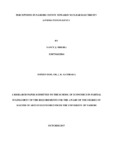| dc.contributor.author | Mberia, Nancy J. | |
| dc.date.accessioned | 2018-01-05T08:44:21Z | |
| dc.date.available | 2018-01-05T08:44:21Z | |
| dc.date.issued | 2017-10 | |
| dc.identifier.uri | http://hdl.handle.net/11295/102202 | |
| dc.description | Research Paper Submitted To the School Of Economics in Partial Fulfillment of the Requirements for the Award of the Degree of Master of Arts in Economics from the University of Nairobi | en_US |
| dc.description.abstract | Electricity demand in Kenya has grown steadily over the years and the trend is expected to continue. The country’s electricity is currently generated using renewable energy resources and fossil fuels. Nuclear electricity has been taken into consideration in the country’s energy planning as a potential source of electricity in the long-term. Nuclear technology used for electricity generation is capable of safely producing large amounts of reliable electricity at relatively low prices. Public acceptance is one of the prerequisites for successful introduction of nuclear electricity in the country. The public’s perceptions towards nuclear electricity generation are shaped by, among other things, the potential benefits and risks of the technology. This study sought to determine the public’s perception of nuclear electricity generation in the country and to investigate the factors that influence their perception. The study based its statistical analyses on a logit model and used it to deduce the public’s perception of nuclear electricity as well as the relative importance of each of the explanatory variables in influencing their perception. The study relied on primary data collected using a questionnaire administered to 96 respondents in Nairobi County. The study found that majority of the respondents (70.83%) supported the inclusion of nuclear electricity in the country’s energy mix in the long-term with a minority (29.17%) rejecting it. The study also found that a number of factors namely age, knowledge about nuclear electricity, remedies and timing played a role in shaping the public’s perception. These factors therefore ought to be factored in during design and implementation of initiatives by the Government aimed at gaining acceptance of the technology. The Government’s stakeholder involvement initiatives ought to be tailored towards creating awareness through adequate knowledge dissemination to the public, particularly among the younger generation. The Government ought to also create public forums through which it can engage different stakeholders in the nuclear electricity programme and get their views so as to ensure sustainability of policy decisions regarding the programme. | en_US |
| dc.language.iso | en | en_US |
| dc.publisher | University of Nairobi | en_US |
| dc.rights | Attribution-NonCommercial-NoDerivs 3.0 United States | * |
| dc.rights.uri | http://creativecommons.org/licenses/by-nc-nd/3.0/us/ | * |
| dc.title | Perceptions in Nairobi county towards nuclear electricity generation in Kenya | en_US |
| dc.type | Thesis | en_US |



